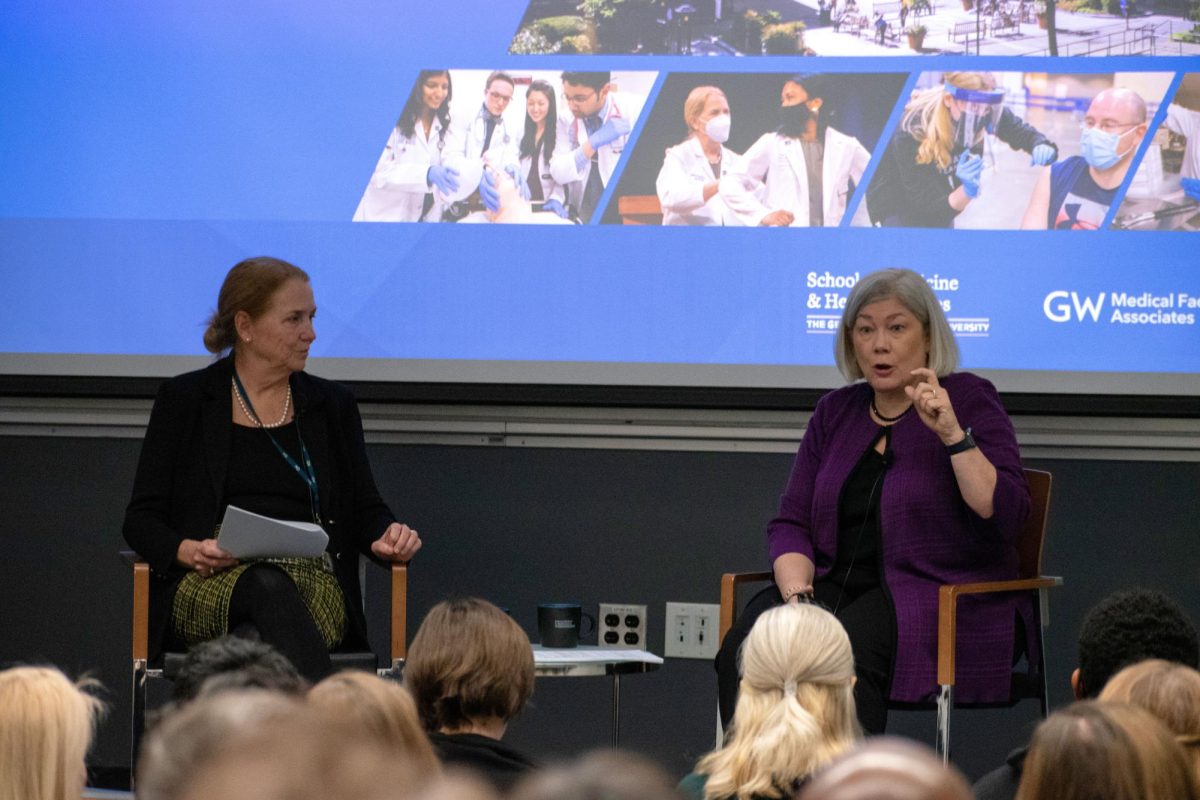University President Ellen Granberg said at an event in Ross Hall on Wednesday that officials are considering how to use the University’s real estate portfolio to benefit students as they prepare a new campus plan.
Granberg said she acknowledges School of Medicine and Health Sciences buildings are “aging,” adding that now is the best time to discuss physical plans for campus buildings ahead of GW’s renegotiations with D.C. officials in three years about the University’s campus plan. The conversation with moderator SMHS Dean Barbara Bass was hosted by the medical school.
“It’s a good time to be having these conversations, and it’s definitely begun at the officer level,” Granberg said. “It goes through a significant process with community input, with campus input. So this will be something we’ll be able to share more about, I would guess, starting this summer.”
Granberg said the University is considering how to utilize The Avenue, an apartment complex also home to several retailers it recently purchased, to help provide new opportunities for undergraduate students. She added that the University is considering ways to utilize the several buildings it owns where the current occupants’ leases are running out, like a World Bank office building.
Granberg said she wants to create new facilities where different schools can interact, like a lab area for engineering and medical students to collaborate on wearable technology, robotics and treatment. She added that she wants to create a professional development program within Academic Affairs so officials can more effectively pair faculty with jobs that match their talents.
Granberg said GW researchers often go beyond publishing their research to find ways their research can be used in the real world, citing students in physical, occupational and speech therapy programs who worked with parents of children with physical and mental disabilities so the children could participate in the White House’s annual easter egg hunt as an example.
“I believe that if we empower individuals, and if we give them the resources and the tools that they need to succeed, and if we foster an environment that supports that and cares about that, then what we do is we collectively elevate the University,” said Granberg.
Granberg said SMHS recently got FDA approval for the first basket clinical trials of two treatments for fatal mitochondrial diseases.
When asked about campus safety, Granberg said officials have requested funding for creating “physical spaces” in places like the I Street Mall next to Ross Hall that are safer. Officials said they plan to conduct “major” landscaping, add lighting and reconfigure seating on I Street Mall this summer.
She said officials are also working to better address incidents like when a homicide suspect escaped police custody at GW Hospital causing officials to issue an hourslong shelter-in-place order to students on the Foggy Bottom Campus. She also said she is working on creating a set of standards to more accurately decide when to close campus in the event of severe weather conditions in light of the recent campus weather-related closure Jan. 16.
When asked about tension on campus during “challenging times,” Granberg said she wants the three-part plan officials announced last month that addresses students and faculty affected by the conflict in the Gaza Strip to be a “living” plan and that the University is looking for input and suggestions on how they can better address the situation.
She said officials are working on a webspace for community members to send feedback to and that there is a working group meeting regularly to discuss policies.
“We’re hoping that it will be helpful to people. That’s the idea, is for this to be truly be helpful to people who need support,” Granberg said. “And then also for us to use this as an opportunity to really emphasize what our historic strengths are, which are those ideas of free inquiry about freedom and of mutual respect.”





